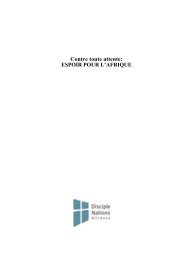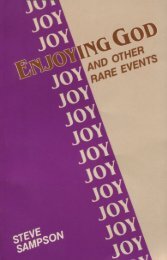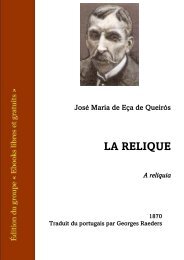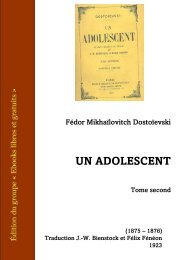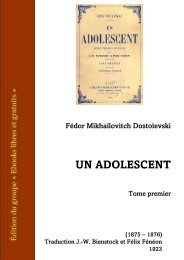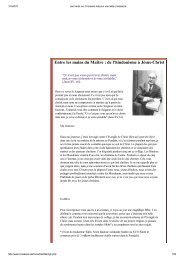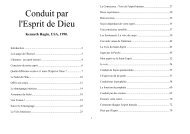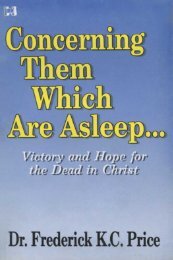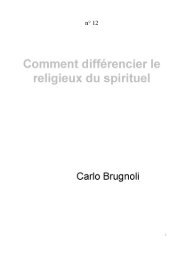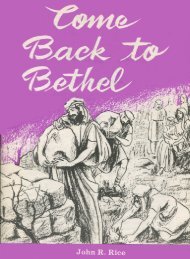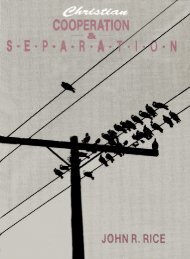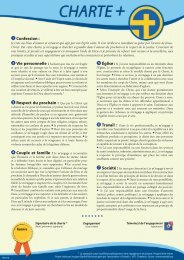341332
You also want an ePaper? Increase the reach of your titles
YUMPU automatically turns print PDFs into web optimized ePapers that Google loves.
34 FATHERS, PASTORS AND KINGS<br />
and protector. Even in its otherwise limited decrees on residence, it managed<br />
to incorporate the New Testament’s analogy of the good shepherd, to underline<br />
the fact that bishops could not ‘like hirelings . . . desert the flocks committed<br />
to them’, for only resident bishops could properly ‘attend to the<br />
guardianship of their sheep’. Prelates should be vigilant in carrying the ‘burden<br />
formidable even to the shoulders of angels’, that of directing souls towards salvation.<br />
This metaphor was carried through to the second decree on residence,<br />
where bishops were urged to reside as ‘shepherds and leaders’ of the flock<br />
entrusted to them. 70 Likewise, the bishop’s duty to oversee the moral welfare<br />
of his charges was based on the image of the benevolent shepherd and father,<br />
reproving, entreating and rebuking those under his protection, ‘in all kindness<br />
and patience’. 71 Session XXV’s decree dealing with the living habits of bishops<br />
also attempted to base its call for modesty of table and train upon a pastoral<br />
spirituality. Bishops were to ‘manifest simplicity, zeal for God and a contempt<br />
for vanities’ on all occasions. Their temperate example would encourage<br />
‘moderation, modesty, continence’ and humility in those whom they supervised.<br />
Here, the analogy of service was adopted, with bishops presented as ‘the<br />
servants of the servants of God’, those called to labour and care ‘for the glory<br />
of God’ and ‘the salvation of souls’. They were to deport themselves so that<br />
their lives became ‘a sort of perpetual sermon’, testaments to God’s glory and<br />
consistent with the character of their office. 72<br />
The legislators at Trent were obviously seeking to associate the lives of<br />
bishops with their vocational responsibility for the souls in their care: the<br />
example and supervision of bishops would lead others towards imitation of<br />
their virtues, towards a more Christian life and ultimately, it was implied,<br />
towards God. Yet here too, Trent was not truly innovating since its pastoral<br />
images of protection, fatherhood, service and guidance were all traditional<br />
themes drawn from sources like Saint Paul, Ignatius of Antioch and Gregory the<br />
Great. 73 Indeed, the Council frequently included biblical quotations to support<br />
its advice and to connect its bald rules with the conscientious bishop’s personal<br />
faith. Session VI’s precept on residence quoted Paul’s advice to Timothy, a classic<br />
text on episcopal duties. 74 But the directives produced were not only traditional;<br />
they were also limited in value. Assessed as a whole, Trent’s legislation<br />
on episcopacy was overwhelmingly legalistic and focused on the disciplinary<br />
power of bishops to bring about religious order. It offered only glimpses of the<br />
possible theological and spiritual perspectives behind bureaucratic functions. Its<br />
decree on preaching, which might have been expected to provide the occasion<br />
for references to the pastoral basis of instruction and teaching, did not do so,<br />
but merely directed bishops to preach personally and to appoint suitable persons<br />
to do so within their dioceses ‘for the welfare of the faithful’. There was<br />
no reference to the source of bishops’ obligations to preach and instruct, that




